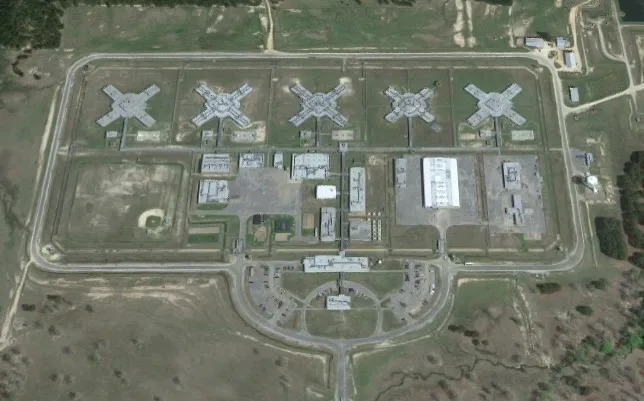Investigators Wanted to Close an Abusive ICE Facility. Biden’s Administration Extended Its Contract.
The Appeal found a systemic culture of abuse and mismanagement at the Winn Correctional Center, an ICE jail in Louisiana. Biden’s administration has kept people detained there against the wishes of government investigators and multiple U.S. senators.

The hunger-striking immigrants began to chant inside the detention center.
“Mr. Biden, help us!” they shouted, according to a federal complaint filed by immigrant advocacy organizations. “Give us freedom!”
It was January, and the strikers were detained inside the Winn Correctional Center—an Immigration and Customs Enforcement (ICE) jail with a long history of abuse near Winnfield, Louisiana. The detainees had declared a mass hunger strike to protest both conditions inside—including significant abuse, an unsanitary environment, and medical neglect—and ICE’s inaction on their immigration cases. Advocates say about 200 detainees joined in on the protest.
“Winn Correctional is no good!” they yelled. “Louisiana is racist!”
For years, federal investigators, lawmakers, immigrants, and advocates have called for ICE to shutter the Winn Correctional Center. Despite widespread allegations of abuse, mismanagement, and inhumane conditions, in May, the Biden administration temporarily extended the facility’s contract. And, despite pressure from high-ranking Democratic senators, ICE will likely extend it again for five more years.
The Appeal found a systemic culture of abuse and mismanagement at Winn, based on hundreds of pages of federal government reports, inspection documents, civil rights complaints, and interviews with attorneys and a former facility correctional guard.
During the January protest, as the immigrants chanted inside their unit, private correctional staff dressed in black riot gear began to move in. A former correctional officer who spoke to The Appeal said the guards informally call themselves the “Takedown Team.”
The complaint—submitted this year to the Department of Homeland Security’s Office for Civil Rights and Civil Liberties (CRCL) by a coalition of advocacy organizations—details what happened next. As the “Takedown Team” rushed into the unit, they began deploying canisters of pepper spray without warning.
“Shut up motherfuckers!” they yelled.
The guards then moved through four pods in the unit and continued spraying detainees in the face. Immigrants began to run, yell, and cough. Their throats burned. Their eyes teared up. Some tried to hide behind beds or used whatever they could find to cover their faces.
“My breathing became very hard,” a detained man later told advocates. “I couldn’t see. My eyes were on fire. I tried to step back after they sprayed me to get away, and I fell on my back to the ground.”
The complaint alleges the guards then exited the unit, locked the doors and windows, and cut power and water. For three hours or so, the immigrants say they were denied medical care, aside from a few individuals who had passed out from the use of force.
At the Winn Correctional Center, operated by the private prison company LaSalle Corrections, it’s not out of the ordinary for guards to pepper-spray people. According to records and reports reviewed by The Appeal, Winn guards have used chemical agents at least 10 times since December 2019.
“U.S. Immigration and Customs Enforcement (ICE) fully respects the rights of all people to voice their opinion without interference,” the agency said in a statement. “ICE does not retaliate in any way against hunger strikers.”
In 2021, CRCL investigators dug into the jail and issued scathing reports. Those documents recommended the federal government close the facility or draw it down until it can be improved. However, immigration advocates say there were no substantial changes to the quality of conditions following the investigation.
In May, Democratic senators, including Sens. Elizabeth Warren, Bernie Sanders, Cory Booker, and others, wrote a letter to the Department of Homeland Security (DHS) and ICE urging the agencies to close four troubled immigrant jails, including Winn.
The next day, the Biden Administration extended Winn’s contract for another month and a half.

Winn’s current contract expired on June 30. It is slightly unclear what happened next. But both ICE and newly elected Winn Parish Sheriff Josh McAllister expressed a desire to continue operations. ICE’s original proposal, accessed by Southern Poverty Law Center attorneys and viewed by The Appeal, was to extend the contract until November 15.
In a statement to The Appeal, ICE said it still needs beds at the Winn Correctional Center and intends to renew its deal.
“ICE is in the final process of renewing the contract for a five-year term,” an ICE spokesperson said.
Huey Fischer García, a staff attorney with the Southern Poverty Law Center’s Southeast Immigrant Freedom Initiative, told The Appeal he worries about the consequences of extending the agreement.
“A contract extension would result in more deaths, more medical abuse, more neglect, more detained labor,” García said. “It would be a continuation of both Trump and Biden-era policies that have harmed migrants.”
The Biden administration’s decision to extend Winn’s contract aligns with its contradictory approach to immigration policies. In 2020, towards the end of the Trump presidency, during which immigrants’ rights were systematically attacked, Biden campaigned on a humane approach to immigration. But during his time in office, Biden instead favored punitive policies and private prison companies, leaving migrants vulnerable to abuse.
The Winn Correctional Center previously served as a medium-security prison in Louisiana, operated by the private prison company CoreCivic. (At the time, the company was called Corrections Corporation of America.) In 2016, the prison garnered national infamy when Shane Bauer, a reporter for Mother Jones, published a groundbreaking investigation into Winn. Bauer worked undercover at the facility in 2015, having taken the job to expose the inner workings of a for-profit, private prison.
In 2015, CoreCivic ended its contract to operate the facility, and LaSalle Corrections, another private corrections company, took over the prison. Under the Trump administration, Louisiana became a hub for immigration detention, and in 2019, Winn shifted from detaining state prisoners to detaining asylum seekers and immigrants.
Regardless of the facility’s ownership, systemic problems have plagued the facility, with persistent reports of unsanitary conditions, brutal use of force, and a lack of healthcare services.
Winn’s guards have been accused of pervasively using physical violence on detainees. In addition to the multiple pepper-spraying events, advocates and immigrants have denounced instances of ICE officials and LaSalle guards beating people. In 2021, a Cameroonian asylum-seeker sued the U.S. government, saying five ICE officers at Winn tripped him, pinned him to the ground, twisted his limbs, and kneeled on his neck so they could forcibly take his fingerprints.
In March of this year, a similar use-of-force incident allegedly took place. According to a complaint submitted to CRCL by Jeremy Jong, a staff attorney at Al Otro Lado, a binational immigrant rights organization, a detainee was forced to give his fingerprints for a deportation order. The man did not understand the document and asked for a Spanish-language translation. The complaint says that, after he refused to sign and provide his prints, two ICE officers twisted his arms, while another began choking him.
“A lot of these people are traumatized by their experience there,” Jong said. “You hear people say: ‘If I knew it was this bad, I probably wouldn’t have come.’”

A former correctional officer at the facility, who asked not to be named to protect their identity, expressed significant concerns about the facility conditions and treatment of detainees. They described a pervasive use of force and racism at the jail and said the facility was chronically understaffed.
“Personally, if you look back at any of the LaSalle Corrections facilities, they are all the same way,” the former guard told The Appeal. “After I worked with Winn Correctional, I refused to work with any other LaSalle Corrections facility, just based off my experience with them.”
The former officer also expressed their concern about the use of solitary confinement at the facility, especially when it came to detainees experiencing mental health crises. The former officer said another guard refused to allow a detainee with mental illness out of a solitary cell—even though they are required to have one hour of recreation time—because he claimed the detainee would die by suicide if released. Medical experts agree prolonged solitary confinement worsens a person’s mental health.
LaSalle Corrections, the private company that runs the facility, did not respond to requests for comment.
In 2021, after receiving numerous complaints, CRCL officials began investigating the facility. In scathing reports, the federal officials cited nearly 90 concerns, including those related to medical and mental healthcare, use-of-force, and detainee health and safety.
“When we see something as extreme as the CRCL notices to Winn about deficiencies, we hope that it has a significant impact for the people who are running and monitoring the detention center,” said Gracie Willis, a former senior attorney with the Southern Poverty Law Center’s Southeast Immigrant Freedom Initiative. “But, on the ground, we didn’t see anything change after that. I can’t think of a single thing that we saw improve, be responded to, or get better for the people who are being detained there.”
The facility’s population was reduced to around 300 after the 2021 CRCL investigation. But in the years since, the population has risen, with an average of around 1,400 people currently detained. ICE conducted an audit in January of this year and documented 32 “deficiencies”—consistent with past internal reports on the facility.
In a statement to The Appeal, a CRCL spokesperson said the bureau “is currently assessing ICE’s implementation of the Medical Care recommendations that ICE concurred with in response to CRCL’s 2021 recommendations.”
ICE also told The Appeal the agency is “firmly committed to the health and welfare of all those in its custody” and added that “the agency continuously reviews and enhances civil detention operations to ensure noncitizens are treated humanely, protected from harm, provided appropriate medical and mental health care, and receive the rights and protections to which they are entitled.”
Biden has not just tacitly supported private prison companies—his administration has gone on the offensive to support them. In New Jersey, the state passed a law banning all contracts to detain immigrants, including in private facilities. This law would have closed the state’s only ICE jail, the Elizabeth Detention Center, operated by CoreCivic. The private prison company sued the state. As part of the lawsuit, the Biden administration submitted a statement supporting CoreCivic, which said the New Jersey law “would cause numerous harms to the United States’ immigration operations, its detainees, and the public, including the possible release of certain dangerous noncitizens.”
In a statement to The Appeal, CoreCivic defended its facilities and business practices.
“CoreCivic plays a valued but limited role in America’s immigration system, which we have done for every administration—Democrat and Republican—for nearly 40 years, including more than 20 years at Elizabeth Detention Center,” a spokesperson said. “It is important to remember that CoreCivic is subject to robust oversight and accountability by our partners at ICE.”
A federal judge ruled in favor of CoreCivic, but the State of New Jersey appealed the decision. An appeals court is now reviewing the Jersey law. ICE was unable to comment on the facility.
“The Biden administration’s legacy, at this point, with policy related to immigration, is one of absolute broken promises,” Willis, the former SPLC attorney, said. While politicians use immigrants as political pawns, “lost in the middle are actual, human people, whose lives are being impacted by these political decisions that are very harmful.”
